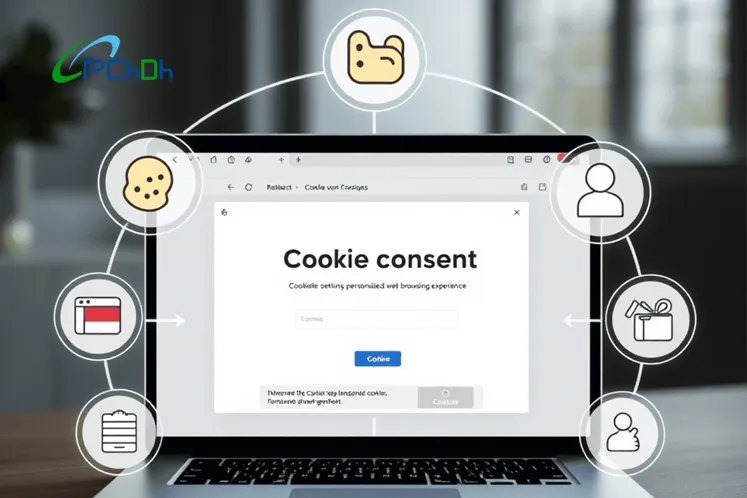Functional Cookies play a vital role in shaping your daily web browsing experience. These digital tools work behind the scenes to remember your preferences and customize website interactions.
Think of functional cookies as your personal digital assistant for each website you visit. They store essential information like:
- Language preferences
- Login details
- Shopping cart items
- Display settings
- Chat widget preferences
These cookies enhance website performance by creating a seamless browsing experience tailored to your needs. When you visit an online store, functional cookies remember your shopping cart contents even if you close your browser.
Functional cookies differ from tracking cookies – they don’t monitor your activities across different websites. Their sole purpose is to improve your interaction with specific sites you choose to visit.
A website without functional cookies would feel like starting fresh every time you visit. You’d need to:
- Reset your language choice
- Re-enter login information
- Lose saved items in shopping carts
- Adjust display preferences repeatedly
The power of functional cookies lies in their ability to make websites work smarter for you. They transform generic web pages into personalized spaces that remember how you like to interact with them.
Understanding Functional Cookies
Functional cookies are like digital memory for websites. They store specific user preferences and settings to make your browsing experience smoother. These small text files work behind the scenes to remember your choices and customize website features according to your needs.
Key Characteristics of Functional Cookies:
- Store non-essential but helpful information
- Limited to single website functionality
- Do not track cross-site behavior
- Require explicit user consent
- Focus on improving user experience
Functional cookies are different from other types of cookies because they have a specific purpose and scope:
| Cookie Type Primary Purpose Data Collection Functional | User preferences & features | Site-specific settings |
| Essential | Basic website operation | Technical requirements |
| Analytical | Performance tracking | User behavior metrics |
| Advertising | Marketing targeting | Cross-site tracking |
These digital helpers store various types of data to enhance your browsing experience:
- Login Information: Username preferences, session tokens, authentication status
- Display Settings: Language selection, font size choices, color scheme preferences, layout options
- Feature Preferences: Video player settings, sound levels, chat widget positions, form field data
A practical example shows functional cookies at work: When you visit a multilingual website and select English as your preferred language, functional cookies remember this choice. Your next visit automatically displays content in English without requiring another language selection.
The data stored in functional cookies is limited to improving website functionality. A shopping website uses these cookies to remember items in your cart, while a content platform might save your reading progress or playlist arrangements.
These cookies create a connection between user preferences and website functionality, turning generic web pages into personalized digital spaces that respond to individual needs and choices.
Enhancing Website Performance with Functional Cookies
Functional cookies in web browsing are powerful tools for optimizing website performance through intelligent data storage. These cookies create a seamless browsing experience by remembering specific user preferences and settings.
Speed Optimization Through Saved Preferences
Functional cookies help improve website performance by eliminating the need for users to input the same information repeatedly. Here are some examples of how saved preferences can speed up the browsing experience:
- Automatic language selection based on previous visits
- Pre-loaded theme preferences (dark/light mode)
- Saved form data for faster checkout processes
- Customized dashboard layouts for registered users
A practical example: an e-commerce site can maintain shopping cart contents across multiple browsing sessions, saving users from reconstructing their carts.
Reduced Server Load Benefits
When functional cookies store certain data on the user’s device instead of sending requests to the server, it results in several benefits:
- Decreased data processing requirements
- Faster page load times
- Minimized authentication requests
- Streamlined user interactions
The implementation of functional cookies enables websites to store video playback preferences:
- Preferred volume settings
- Selected resolution quality
- Subtitle language choices
- Playback speed preferences
These stored settings create a personalized viewing experience without requiring manual adjustments each time.
Task Automation Through Cookie Data
Functional cookies also play a role in automating tasks that would otherwise require user input. Here are some ways cookie data can streamline actions:
- Auto-filling registration forms
- Maintaining login states
- Saving custom filter selections
- Preserving sorting preferences
A news website utilizing functional cookies can remember a user’s preferred article layout, content categories, and font size settings. This personalization leads to reduced bounce rates and increased user engagement.
The strategic use of functional cookies transforms repetitive actions into automated processes. Users spend less time configuring settings and more time engaging with website content. This efficiency boost translates into improved website metrics and enhanced user satisfaction.
Personalized Experiences Through Functional Cookies
Functional cookies in web browsing transform generic websites into personalized digital spaces. These digital tools remember your preferences, creating a unique browsing experience tailored to your needs.
Key Personalization Features:
- Language Preferences: Websites automatically display content in your chosen language
- Font Size Settings: Text appears in your preferred size for comfortable reading
- Color Schemes: Dark mode or custom color preferences stay consistent
- Layout Customization: Content arrangement matches your viewing preferences
- Regional Settings: Time zones, currencies, and local content adapt to your location
Website owners leverage functional cookies to deliver customized experiences that boost user satisfaction and engagement. A visitor from France automatically sees French content, while a user in Japan views Japanese text – all through cookie-based personalization.
Benefits for Users:
- Consistent browsing experience across multiple sessions
- Reduced need to reset preferences
- Faster access to relevant content
- Improved website navigation
- Enhanced accessibility options
Advantages for Website Owners:
- Higher user engagement rates
- Reduced bounce rates
- Increased time spent on site
- Better user satisfaction scores
- Improved conversion rates
Functional cookies enable dynamic content adaptation based on user behavior. When you adjust video quality settings or customize dashboard widgets, these preferences persist across your browsing sessions.
The personalization capabilities extend to:
- Social media feed arrangements
- Newsletter frequency preferences
- Product display formats
- Custom theme selections
- Accessibility requirements
These personalization features create an intuitive browsing environment where websites remember and adapt to individual user needs. Each interaction becomes more efficient as functional cookies maintain your chosen settings.

Session vs Persistent Functional Cookies: A Comparison
Functional cookies in web browsing come in two distinct varieties: session-based and persistent cookies. Each type serves specific purposes and operates differently in terms of data retention and user experience.
Session-Based Functional Cookies
Session cookies exist temporarily during your active browsing session. These cookies:
- Disappear when you close your browser
- Store temporary preferences
- Enable seamless navigation between pages
- Remember items in shopping carts
- Maintain login status during browsing
Persistent Functional Cookies
Persistent cookies remain on your device for a set period. These cookies:
- Stay active from days to months
- Remember long-term preferences
- Store login credentials
- Keep language settings
- Save personalized themes
Data Storage Duration
Session Cookies:
- Limited lifespan
- Automatic deletion upon browser closure
- No permanent storage space usage
- Enhanced privacy protection
Persistent Cookies:
- Predefined expiration dates
- Manual deletion options
- Minimal storage space required
- Regular automatic cleanup
Impact on User Experience
Session cookies create a fluid browsing experience by:
- Maintaining temporary states
- Reducing repeated data entry
- Enabling smooth page transitions
- Supporting multi-step processes
Persistent cookies enhance long-term usability through:
- Faster subsequent visits
- Remembered preferences
- Automatic login capabilities
- Consistent site appearance
Use Case Scenarios
Session Cookies Best For:
- E-commerce shopping carts
- Multi-page forms
- Temporary preferences
- Single-visit customizations
Persistent Cookies Ideal For:
- Login credentials
- Language preferences
- Theme settings
- Regional content delivery
The choice between session and persistent functional cookies depends on the specific feature requirements and user needs. Website developers select the appropriate type based on data retention needs and user convenience factors
Privacy Considerations for Using Functional Cookies Legally and Transparently
Functional cookies in web browsing operate differently from tracking cookies. They focus solely on enhancing user experience within a single website, never collecting or sharing data across multiple sites.
Key Privacy Features of Functional Cookies:
- Store preferences only for the host website
- No cross-site tracking capabilities
- Limited data collection scope
- Clear purpose-driven functionality
The implementation of major privacy regulations has transformed cookie management practices:
GDPR Requirements
- Explicit user consent before cookie deployment
- Clear explanation of cookie purposes
- Option to withdraw consent
- Regular cookie audits
CCPA Guidelines
- Right to opt-out of cookie usage
- Transparent data handling practices
- Access to stored cookie information
- Deletion rights for California residents
Consent Management Platforms (CMPs) serve as essential tools:
- Automatic cookie scanning
- Customizable consent banners
- Real-time preference updates
- Cookie policy generation
- Compliance documentation
Website owners must implement proper consent mechanisms through:
- Visible cookie banners
- Easy-to-understand privacy notices
- Accessible preference centers
- Clear opt-out options
Users maintain control through several rights:
- Accept or reject cookies
- Access stored preferences
- Modify consent choices
- Request data deletion
- Review cookie policies
Modern CMPs streamline compliance by:
- Automating consent collection
- Tracking user preferences
- Generating compliance reports
- Updating privacy policies
- Managing cookie lifecycles
Privacy-focused cookie implementation requires:
- Regular policy updates
- Technical safeguards
- User preference respect
- Documentation maintenance
- Compliance monitoring
These measures create trust between websites and users while maintaining functional cookie benefits for enhanced browsing experiences.
Common Use Cases of Functional Cookies on Websites
Functional cookies in web browsing power numerous everyday website features that users rely on. Let’s explore real-world applications that showcase their practical value:
1. Login Credentials Storage
Functional cookies help manage login credentials effectively, ensuring a smooth authentication process for users. Here are some key functionalities enabled by these cookies:
- Automatic login on returning visits
- Secure session management
- Username pre-filling in login forms
2. Shopping Experience
When it comes to online shopping, functional cookies play a crucial role in enhancing the overall experience for customers. Here are some ways these cookies contribute to a seamless shopping journey:
- Shopping cart retention between sessions
- Saved product preferences
- Wishlist maintenance
- Recently viewed items tracking
3. Form Management
Filling out forms can often be tedious and time-consuming, but functional cookies come to the rescue by streamlining this process. Here’s how these cookies make form management more efficient:
- Auto-completion of shipping details
- Saved billing information
- Pre-filled registration forms
- Multi-step form progress retention
4. Media Preferences
Whether it’s adjusting video settings or choosing audio preferences, functional cookies ensure that users’ media choices are remembered across sessions. This leads to a more personalized viewing or listening experience. Here are some specific media preferences managed by these cookies:
- Video player volume settings
- Preferred playback quality
- Subtitle language choices
- Audio settings persistence
5. Chat Widget Settings
For websites that offer live chat support, functional cookies help maintain consistency in chat interactions. This is particularly beneficial for returning visitors who may want to continue conversations from where they left off. Here are some aspects of chat widget settings managed by these cookies:
- Previous conversation history
- Agent preferences
- Chat window position
- Notification preferences
These functional cookie implementations create a seamless user experience by eliminating repetitive tasks. Users spend less time re-entering information and can focus on their primary goals. Website owners benefit from reduced bounce rates and increased user satisfaction through personalized interactions.
The effectiveness of functional cookies in web browsing shines through reduced friction points in user journeys. A first-time visitor might spend minutes configuring preferences, but returning users enjoy instant access to their customized settings.
Best Practices for Website Owners Using Functional Cookies
Website owners must implement strategic practices when using functional cookies in web browsing to maintain user trust and legal compliance.
Clear Communication
- Display comprehensive cookie notices explaining the purpose of functional cookies
- Use simple, jargon-free language to describe cookie functionality
- Provide detailed information about data storage duration
- Include clear opt-out instructions for users
Regular Cookie Audits
- Conduct monthly cookie scans to identify all active cookies
- Remove outdated or unnecessary functional cookies
- Document changes in cookie implementation
- Update privacy policies to reflect current cookie usage
Effective CMP Implementation
- Select a reliable Consent Management Platform
- Configure granular cookie categories
- Enable real-time consent logging
- Maintain accurate records of user preferences
Data Minimization Strategies
- Collect only essential user preferences
- Set appropriate cookie expiration dates
- Implement automatic data deletion processes
- Use session cookies when persistent storage isn’t necessary
Technical Optimization
- Regular testing of cookie functionality
- Performance monitoring of cookie-dependent features
- Integration of cookie-blocking detection
- Backup systems for essential features when cookies are disabled
These practices help website owners maintain a balance between personalization and privacy while ensuring functional cookies enhance user experience without compromising trust or compliance.
The Future of Functional Cookies in Web Browsing
The world of functional cookies in web browsing is constantly changing due to rapid technological advancements. Browser developers are now implementing stricter controls, giving users unprecedented power over their cookie preferences.
Key Future Trends:
- AI-powered cookie management systems that automatically adjust settings based on user behavior
- Enhanced privacy features allowing granular control over individual cookie functions
- Browser-level tools for managing functional cookies across multiple websites
- Integration of blockchain technology for secure cookie data storage
Privacy regulations play a significant role in shaping the development of future trends functional cookies. The introduction of new laws in various regions pushes websites to find innovative ways to obtain user consent.
Expected Privacy Developments:
- Standardized global cookie regulations replacing regional variations
- Real-time cookie tracking transparency tools
- Automated compliance verification systems
- Enhanced data minimization techniques
The ongoing struggle between personalization and privacy becomes a primary concern. Website owners are actively seeking new methods to provide tailored experiences while still honoring user privacy preferences.
Emerging Solutions:
- Edge computing for local data processing
- Privacy-preserving machine learning algorithms
- Decentralized identity management systems
- Cookie-less tracking alternatives
These advancements are transforming how websites use functional cookies, leading to a safer and more user-focused browsing experience.
FAQs (Frequently Asked Questions)
What are functional cookies in web browsing and why are they important?
Functional cookies in web browsing are cookies that store user preferences and settings to provide a personalized and seamless browsing experience. They are important because they remember login information, language preferences, and other customizations, enhancing website performance and usability.
How do functional cookies differ from other types of cookies like essential or advertising cookies?
It specifically store user preferences to improve personalization and usability, unlike essential cookies which are necessary for basic website functions, or advertising cookies which track user behavior for marketing purposes. Functional cookies do not track personal data across different sites.
What are some common use cases of functional cookies on websites?
Common use cases include remembering login credentials, saving shopping cart contents, autofilling forms, retaining video playback settings, and enabling chat widget functionalities. These uses significantly enhance the overall user experience by reducing repetitive tasks.
What is the difference between session-based and persistent functional cookies?
Session-based functional cookies last only for the duration of a browsing session and are deleted once the browser is closed. Persistent functional cookies remain stored on the user’s device for a set period to remember preferences across multiple sessions, improving long-term personalization.
How do privacy regulations like GDPR and CCPA affect the use of functional cookies?
Although it do not track personal data across sites, privacy regulations such as GDPR and CCPA require websites to obtain user consent before using any cookies. This ensures transparency and gives users control over their cookie preferences through mechanisms like cookie consent banners and Consent Management Platforms (CMPs).
What best practices should website owners follow when using functional cookies?
Website owners should maintain transparency about cookie usage, conduct regular compliance audits, use CMP tools effectively to manage consents, minimize data collection to respect user privacy, and stay updated with evolving privacy laws to balance personalization with legal requirements.


